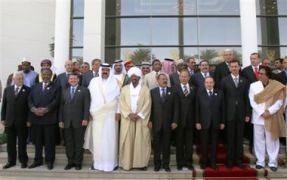Arab summit opens in Khartoum with sharp divisions over final communique
Mar 28, 2006 (KHARTOUM) — The annual Arab League summit was sharply divided even before it began Tuesday, with late-night wrangling over the wording of the final declaration and the absence of a number of key leaders at a meeting meant to tackle the region’s tricky problems.

Although regional heavyweights Egypt and Saudi Arabia did not send their heads of state, Jordan’s King Abdullah II arrived shortly before the meeting began, countering earlier reports that he would also not attend.
The gathering opened with a recitation from the Quran, Islam’s holy book, and an address by Algerian President Abdelaziz Bouteflika, host of last year’s summit.
Some of the absent leaders cited security concerns, others have political differences with the Sudanese government. The United States government had also asked friendly Arab leaders to stay away to prevent a show of support for the Sudanese government, under international pressure to allow U.N. peacekeepers in the wartorn western region of Darfur, said several Arab diplomats from countries whose heads of state were absent.
In light of the many no-shows, the summit was likely to be shortened to one day instead of two, diplomats said.
Another blow to the annual meeting could come early on the agenda.
Arab League Secretary-General Amr Musa, whose term expires in May, was expected to be nominated for a second term. But the leading Sudanese daily Al-Sahafa reported that Yemen was putting forward its own candidate at the last minute, a move that would highlight the lack of consensus among Arab leaders.
The annual meeting of the 22-member league is contending with complex issues involving Iraq’s future, Iran’s dispute with the West over its nuclear program and how to deal with a Hamas-led government in the Palestinian territories.
In his address, Bouteflika rejected calls to isolate a Hamas-led government, saying such attempts would amount to the “punishment of the entire Palestinian people.”
He also called on Iraqis to close ranks to avoid a sectarian conflict pitting the country’s Shiite majority against the once-dominant Sunni Arab minority.
Iraq’s neighbors, he said, should “honestly cooperate with the Iraqi people to preserve the country’s integrity and unity.”
Hours before leaders arrived at the summit’s venue, a conference center at the convergence of the White and Blue Nile rivers, armed Sudanese soldiers in blue camouflage sealed off the streets and set up checkpoints.
Dogs sniffed bags and metal detectors and scanners were used to screen delegates, journalists and organizers coming into the complex.
Sudan is hoping to garner the support of other Arab countries in its position on the Darfur conflict, where it is resisting Western pressure — and a U.N. resolution — for the African Union peacekeeping force to be replaced later this year by a much bigger U.N. force.
While Egypt has been very supportive of Khartoum, and the final resolution expresses support, there is a view that Sudan is seeking to exploit its standoff with the West for its own ends.
Late Monday, ministers worked for four hours to agree on the wording of the Darfur section in the final resolution. Sudan had come up with a version that was unacceptable to Moussa, diplomats said, and it was altered to offer only vague support for Sudan. The resolution also does not commit Arabs to any financing of African Union forces, as the United States had hoped for.
More than 180,000 people have been killed in three years of fighting in Darfur, western Sudan, and more than 2 million people have been displaced. The African Union recently extended its peacekeeping mandate there until Sept. 30.
Another key resolution to be approved at the summit urges Arab countries to send ambassadors to Iraq, a key demand of the embattled Baghdad government.
The U.S. State Department urged Arab leaders to “be as supportive as possible of the new Iraqi government” by sending ambassadors and economic assistance to Baghdad.
The resolution on Iraq pledges that Arab countries will open embassies as soon as possible — though it gave no timeframe.
Another promises that Arabs will continue funding the Palestinian Authority despite U.S. calls for a halt of financial aid to a government led by the radical Hamas group.
Some Sudanese have complained that the impoverished country should not spend its money on the summit. Popular columnist Jaafar Abbas criticized the summit in Al-Sahafa newspaper on Tuesday.
“What is the volume of Arab investment in Sudan in comparison with the Chinese or Indian? I don’t believe it is hospitality when a Bedouin slaughters his only goat for his guest. Rather, it is stupidity.”
However, Arab diplomats have said Libyan leader Muammar Gadhafi paid the entire US$15 million cost of the summit.
(ST/AP)
